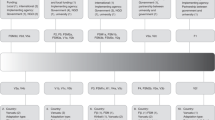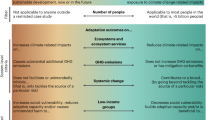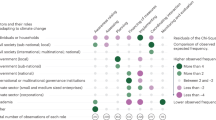Abstract
The international community's support for adaptation in developing countries has proliferated through numerous complementary funding mechanisms. A range of serious practical issues are emerging, however, as adaptation moves from theory and international negotiation to implementation. We identify three areas deserving greater scrutiny: in-country priorities, entry points and delivery systems, and provide recommendations for improving adaptation practice. These concerns, if not addressed, have the potential to hamper attempts at effective delivery and to increase the vulnerability of intended beneficiaries of the adaptation agenda.
This is a preview of subscription content, access via your institution
Access options
Subscribe to this journal
Receive 12 print issues and online access
$209.00 per year
only $17.42 per issue
Buy this article
- Purchase on Springer Link
- Instant access to full article PDF
Prices may be subject to local taxes which are calculated during checkout
Similar content being viewed by others
References
Law, E. A., Thomas, S., Meijaard, E., Dargusch, P. J. & Wilson, K. A. A modular framework for management of complexity in international forest-carbon policy. Nature Clim. Change 2, 155–160 (2012).
World Resources Institute Summary of Developed Country 'Fast-Start' Climate Finance Pledges (World Resources Institute, 2012); http://go.nature.com/ce5LoP
Donner, S. D. et al. Preparing to manage climate change financing. Science 334, 908–909 (2011).
Ballu, V. et al. Comparing the role of absolute sea-level rise and vertical tectonic motions in coastal flooding, Torres Islands (Vanuatu). Proc. Natl Acad. Sci. USA 108, 12967–12968 (2011).
Connell, J. Population resettlement in the Pacific: Lessons from a hazardous history? Aust. Geogr. 43, 127–142 (2012).
Conway, D. From headwater tributaries to international river basin: Adaptation to climate variability and change in the Nile River basin. Glob. Environ. Change 15, 99–114 (2005).
Mustelin . et al. Understanding current and future vulnerability in coastal settings: Community perceptions and preferences in Zanzibar, Tanzania. Popul. Environ. 31, 371–398 (2010).
Conway, D. Adapting climate research for development in Africa. WIREs Clim. Change 2, 428–450 (2011).
Ju, H. et al. Adaptation Framework and Strategy Part 3: An Adaptation Strategy for Agriculture in Ningxia, Northwest China (AEA Group, 2008).
Burton, D. et al. Climate Change impacts on Children in the Pacific: Kiribati and Vanuatu Technical Report (UNICEF, 2011).
Reid, H. et al. in Understanding Climate Change Adaptation: Lessons from Community-Based Approaches (eds Ensor, J. & Berger, R.) 11–30 (Practical Action, 2009).
Sherman, M. & Ford, J. Stakeholder engagement in adaptation interventions: An evaluation of projects in developing nations. Clim. Policy http://doi.org/r45 (2013).
Adger, W. N., Paavola, J., Huq, S. & Mace, M. J. (eds) Fairness in Adaptation to Climate Change (MIT Press, 2006).
Preston, B., Mustelin, J. & Maloney, M. Climate adaptation heuristics and the science/policy divide. Mitig. Adapt. Strat. Glob. Change http://doi.org/r46 (2013).
Barnett, J. & O'Neill, S. J. Maladaptation. Glob. Environ. Change 20, 211–213 (2010).
Barnett, J. & O'Neill, S. J. Islands, resettlement and adaptation. Nature Clim. Change 2, 8–10 (2012).
Patt, A. Multi-level climate adaptation policy and causation narratives. Geogr. Tidsskr. 112, 174–182 (2012).
Mortreux, C. & Barnett, J. Climate change, migration and adaptation in Funafuti, Tuvalu. Glob. Environ. Change 19, 105–112 (2009).
Birkmann, J. First- and second-order adaptation to natural hazards and extreme events in the context of climate change. Nat. Hazards 58, 811–840 (2011).
Hedger, M. M., Connell, R. & Bramwell, P. Bridging the gap: Empowering decision-making for adaptation through the UK Climate Impacts Programme. Clim. Policy 6, 201–215 (2006).
Adger, W. N., Arnell, N. W. & Tompkins, E. L. Successful adaptation to climate change across scales. Glob. Environ. Change 15, 77–86 (2005).
World Bank Reducing the Risk of Disasters and Climate Variability in the Pacific Islands, Papua New Guinea Country Assessment (World Bank/SOPAC/GFDRR, 2009); http://go.nature.com/qkE2Ei
Kates, R. W., Travis, W. R. & Wilbanks, T. J. Transformational adaptation when incremental adaptations to climate change are insufficient. Proc. Natl Acad. Sci. USA 109, 7156–7161 (2012).
Smith, M. S., Horrocks, L., Harvey, A. & Hamilton, C. Rethinking adaptation for a 4 C world. Phil. Trans. R. Soc. A 369, 196–216 (2011).
Park, S. E. et al. Informing adaptation responses to climate change through theories of transformation. Glob. Environ. Change 22, 115–126 (2012).
Mullan, M., Kingsmill, N., Kramer, A. M. & Agrawala, S. National Adaptation Planning: Lessons from OECD Countries No. 54 (OECD, 2013).
Bauer, A., Feichtinger, J. & Steurer, R. The governance of climate change adaptation in 10 OECD countries: Challenges and approaches. J. Environ. Policy Planning 14, 279–304 (2012).
Huntjens, P. et al. Institutional design propositions for the governance of adaptation to climate change in the water sector. Glob. Environ. Change 22, 67–81 (2012).
Preston, B., Westaway, R. & Yuen, E. Climate adaptation planning in practice: An evaluation of adaptation plans from three developed nations. Mitig. Adapt. Strat. Glob. Change 16, 407–438 (2011).
Tompkins, E. L. et al. Observed adaptation to climate change: UK evidence of transition to a well-adapting society. Glob. Environ. Change 20, 627–635 (2010).
Berrang-Ford, L., Ford, J. D. & Paterson, J. Are we adapting to climate change? Glob. Environ. Change 21, 25–33 (2011).
Hammill, A. & Tanner, T. M. Harmonising Climate Risk Management: Adaptation Screening and Assessment Tools for Development Co-operation OECD Environment Working Paper 36 ENV/WKP 6 (OECD, 2011).
Petherick, A. Dirty Money. Nature Clim. Change 2, 144–145 (2012).
Mahmud, T. & Prowse, M. Corruption in cyclone preparedness and relief efforts in coastal Bangladesh: Lessons for climate adaptation? Glob. Environ. Change 22, 933–943 (2012).
Brooks, N. et al. Tracking Adaptation and Measuring Development (IIED, 2011).
Moser, S. & Boykoff, M. (eds) Successful Adaptation to Climate Change: Linking Science and Policy in a Rapidly Changing World (Routledge, 2013).
Lamhauge, N., Lanzi, E. & Agrawala, S. The use of indicators for monitoring and evaluation of adaptation: Lessons from development cooperation agencies. Climate and Development 5, 229–241 (2013).
Surminski, S. & Eldridge, J. Observations on the Role of the Private Sector in the UNFCCC's Loss and Damage of Climate Change Work Programme Working Paper 142 (Grantham Research Institute on Climate Change and the Environment, 2013).
Hulme, M., O'Neill, S. J. & Dessai, S. Is weather event attribution necessary for adaptation funding? Science 334, 764–765 (2011).
Hartzell-Nichols, L. Responsibility for meetings the costs of adaptation. WIREs Clim. Change 2, 687–700 (2011).
Van Aalst, M. K., Cannon, T. & Burton, I. Community level adaptation to climate change: The potential role of participatory community risk assessment. Glob. Environ. Change 18, 165–179 (2008).
Hepworth, N. A Progressive Critique of IWRM in Sub-Saharan Africa: Beyond Capacity Towards Self-Determined Regulatory Personality PhD thesis, Univ. East Anglia (2009).
Wyborn, C. & Dovers, S. Prescribing adaptiveness in agencies of the state. Glob. Environ. Change 24, 5–7 (2014).
UNESCO World Commission on the Ethics of Scientific Knowledge and Technology: A Framework of Ethical Principles and Responsibilities for Climate Change Adaptation Adopted at the 7th ordinary session of the World Commission on the Ethics of Scientific Knowledge and Technology (COMEST) in Doha, Qatar (9–12 October, 2011).
Mustelin, J. et al. Climate adaptation research for the next generation. Climate and Development 5, 189–193 (2013).
Dumaru, P. Community-based adaptation: Enhancing community adaptive capacity in Druadrua Island, Fiji. WIREs Clim. Change 1, 751–763 (2010).
Author information
Authors and Affiliations
Corresponding authors
Ethics declarations
Competing interests
The authors declare no competing financial interests.
Rights and permissions
About this article
Cite this article
Conway, D., Mustelin, J. Strategies for improving adaptation practice in developing countries. Nature Clim Change 4, 339–342 (2014). https://doi.org/10.1038/nclimate2199
Received:
Accepted:
Published:
Issue Date:
DOI: https://doi.org/10.1038/nclimate2199
This article is cited by
-
Optimal Implementation of Climate Change Adaptation Measures to Ensure Long-term Sustainability on Large Irrigation Systems
Water Resources Management (2023)
-
A Qualitative Study on How Perceptions of Environmental Changes are Linked to Migration in Morocco, Senegal, and DR Congo
Human Ecology (2022)
-
An assessment of community-based adaptation initiatives in the Pacific Islands
Nature Climate Change (2020)
-
From community-based to locally led adaptation: Evidence from Vanuatu
Ambio (2020)
-
Strengthening the science-policy interface for climate adaptation: stakeholder perceptions in Cameroon
Regional Environmental Change (2019)



